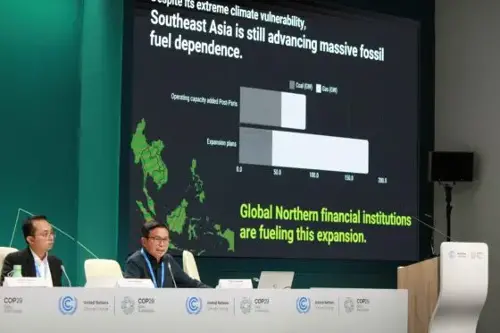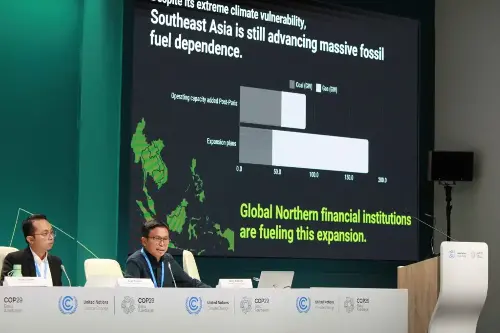

Baku, Azerbaijan—As the world gathers at the Conference of Parties to the United Nations Framework Convention on Climate Change (COP29), a new report highlights a growing paradox in Southeast Asia – while domestic banks are taking the lead in financing a surge in renewable energy, international financial institutions from developed countries continue to fuel the region’s expansion of fossil fuel power.
The report, titled “Southeast Asia at a Crossroads: Deterring SEA’s Fossil Future with Renewables,” by the Center for Energy, Ecology, and Development (CEED), reveals that renewable energy capacity in the pipeline has jumped a substantial growth of 70 gigawatts (GW) in just one year or from 2023 to 2024, with domestic banks at the forefront of renewable energy financing.
This surge in renewables is a welcome development for a region facing the brunt of climate change impacts. The threat of massive fossil fuel expansion, however, persists.
“Southeast Asia suffered severely from what is set to be the warmest year on record, and from devastating calamities even in the weeks leading up to COP29. Unfortunately, despite the region’s vulnerability to climate change and its rich renewable energy potential, massive coal and gas expansion continues in Southeast Asia,” said Gerry Arances, Executive Director of CEED.
Since the Paris Agreement, the region has commissioned 54.5 GW of coal-fired power plants and 33.2 GW of gas-fired power plants, totaling 87.7 GW. This is more than double the installed renewable energy capacity of 33.8 GW.
The report highlights the significant financial commitment to fossil fuels, with approximately USD 142.1 billion invested since the Paris Agreement. In contrast, renewable energy projects and related operations have received around USD 52.8 billion in financing – over half of which are attributed to domestic financial institutions in the region.
“On the one hand, Southeast Asia is demonstrating remarkable leadership in renewable energy. On the other hand, continued fossil fuel expansion threatens to undermine these efforts and lock the region into a fossil fuel future,” said Arances. “Much responsibility for this unsustainable trend lies largely with Global North international financial institutions who continue to finance these polluting projects.”
Global Northern financial institutions are significant enablers of Southeast Asian developers and banks heavily involved in fossil fuel expansion – with trends showing that they are the top shareholders and bondholders of many of the region’s biggest fossil fuel companies.
Developed nations are also driving debt financing for fossil fuels – Japan’s financial institutions, for example, represented 23% of the region’s total financing, primarily through the Japan Bank for International Cooperation (JBIC).
As COP29 facilitates critical conversations on ambitions for climate finance globally, CEED called for a stop to finance flows to fossil fuels which exacerbate Southeast Asia’s climate vulnerability. Global Northern financial institutions and governments must instead drive the region’s alignment with the 1.5°C target outlined in the Paris Agreement, the report noted.
“As the climate talks unfold, the Philippines is being battered by a series of devastating storms. An urgent transition away from fossil fuels is necessary to strengthen our region’s climate resilience, avert even more catastrophic climate change, and ensure the climate survival of our people. The fact that fossil fuels continued to receive nearly three times as much financing than renewables in Southeast Asia since Paris means that money to fuel an urgent energy transition and ambitious climate action is available – it’s simply not going to the right places,” said Arances.
Read the full report here: https://ceedphilippines.com/southeast-asia-at-a-crossroads-deterring-seas-fossil-future-with-renewables/
